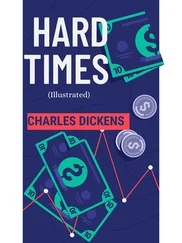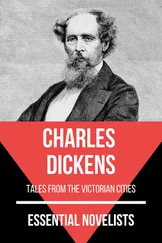“Yes,” they both said.
“Look at “em again,” said Sleary, “look at “em well. You thee em all? Very good. Now, mith;” he put a form for them to sit on; “I have my opinionth, and the Thquire your father hath hith. I don't want to know what your brother'th been up to; ith better for me not to know. All I thay ith, the Thquire hath thtood by Thethilia, and I'll thtand by the Thquire. Your brother ith one them black thervanth.”
Louisa uttered an exclamation, partly of distress, partly of satisfaction.
“Ith a fact,” said Sleary, “and even knowin” it, you couldn't put your finger on him. Let the Thquire come. I thall keep your brother here after the performanth. I thant undreth him, nor yet wath hith paint off. Let the Thquire come here after the performanth, or come here yourthelf after the performanth, and you thall find your brother, and have the whole plathe to talk to him in. Never mind the lookth of him, ath long ath he'th well hid.”
Louisa, with many thanks and with a lightened load, detained Mr. Sleary no longer then. She left her love for her brother, with her eyes full of tears; and she and Sissy went away until later in the afternoon.
Mr. Gradgrind arrived within an hour afterwards. He too had encountered no one whom he knew; and was now sanguine with Sleary's assistance, of getting his disgraced son to Liverpool in the night. As neither of the three could be his companion without almost identifying him under any disguise, he prepared a letter to a correspondent whom he could trust, beseeching him to ship the bearer off at any cost, to North or South America, or any distant part of the world to which he could be the most speedily and privately dispatched.
This done, they walked about, waiting for the Circus to be quite vacated; not only by the audience, but by the company and by the horses. After watching it a long time, they saw Mr. Sleary bring out a chair and sit down by the side-door, smoking; as if that were his signal that they might approach.
“Your thervant, Thquire,” was his cautious salutation as they passed in. “If you want me you'll find me here. You muthn't mind your thon having a comic livery on.”
They all three went in; and Mr. Gradgrind sat down forlorn, on the Clown's performing chair in the middle of the ring. On one of the back benches, remote in the subdued light and the strangeness of the place, sat the villainous whelp, sulky to the last, whom he had the misery to call his son.
In a preposterous coat, like a beadle's, with cuffs and flaps exaggerated to an unspeakable extent; in an immense waistcoat, knee-breeches, buckled shoes, and a mad cocked hat; with nothing fitting him, and everything of coarse material, moth-eaten and full of holes; with seams in his black face, where fear and heat had started through the greasy composition daubed all over it; anything so grimly, detestably, ridiculously shameful as the whelp in his comic livery, Mr. Gradgrind never could by any other means have believed in, weighable and measurable fact though it was. And one of his model children had come to this!
At first the whelp would not draw any nearer, but persisted in remaining up there by himself. Yielding at length, if any concession so sullenly made can be called yielding, to the entreaties of Sissy—for Louisa he disowned altogether—he came down, bench by bench, until he stood in the sawdust, on the verge of the circle, as far as possible, within its limits from where his father sat.
“How was this done?” asked the father.
“How was what done?” moodily answered the son.
“This robbery,” said the father, raising his voice upon the word.
“I forced the safe myself over night, and shut it up ajar before I went away. I had had the key that was found, made long before. I dropped it that morning, that it might be supposed to have been used. I didn't take the money all at once. I pretended to put my balance away every night, but I didn't. Now you know all about it.”
“If a thunderbolt had fallen on me,” said the father, “it would have shocked me less than this!”
“I don't see why,” grumbled the son. “So many people are employed in situations of trust; so many people, out of so many, will be dishonest. I have heard you talk, a hundred times, of its being a law. How can I help laws? You have comforted others with such things, father. Comfort yourself!”
The father buried his face in his hands, and the son stood in his disgraceful grotesqueness, biting straw: his hands, with the black partly worn away inside, looking like the hands of a monkey. The evening was fast closing in; and from time to time, he turned the whites of his eyes restlessly and impatiently towards his father. They were the only parts of his face that showed any life or expression, the pigment upon it was so thick.
“You must be got to Liverpool , and sent abroad.”
“I suppose I must. I can't be more miserable anywhere,” whimpered the whelp, “than I have been here, ever since I can remember. That's one thing.”
Mr. Gradgrind went to the door, and returned with Sleary, to whom he submitted the question, How to get this deplorable object away?
“Why, I've been thinking of it, Thquire. There'th not muth time to lothe, tho you muth thay yeth or no. Ith over twenty mileth to the rail. There'th a coath in half an hour, that goeth to the rail, “purpothe to cath the mail train. That train will take him right to Liverpool .”
“But look at him,” groaned Mr. Gradgrind. “Will any coach—”
“I don't mean that he thould go in the comic livery,” said Sleary. “Thay the word, and I'll make a Jothkin of him, out of the wardrobe, in five minutes.”
“I don't understand,” said Mr. Gradgrind.
“A Jothkin—a Carter. Make up your mind quick, Thquire. There'll be beer to feth. I've never met with nothing but beer ath'll ever clean a comic blackamoor.”
Mr. Gradgrind rapidly assented; Mr. Sleary rapidly turned out from a box, a smock frock, a felt hat, and other essentials; the whelp rapidly changed clothes behind a screen of baize; Mr. Sleary rapidly brought beer, and washed him white again.
“Now,” said Sleary, “come along to the coath, and jump up behind; I'll go with you there, and they'll thuppothe you one of my people. Thay farewell to your family, and tharp'th the word.” With which he delicately retired.
“Here is your letter,” said Mr. Gradgrind. “All necessary means will be provided for you. Atone, by repentance and better conduct, for the shocking action you have committed, and the dreadful consequences to which it has led. Give me your hand, my poor boy, and may God forgive you as I do!”
The culprit was moved to a few abject tears by these words and their pathetic tone. But, when Louisa opened her arms, he repulsed her afresh.
“Not you. I don't want to have anything to say to you!”
“O Tom, Tom, do we end so, after all my love!”
“After all your love!” he returned, obdurately. “Pretty love! Leaving old Bounderby to himself, and packing my best friend Mr. Harthouse off, and going home just when I was in the greatest danger. Pretty love that! Coming out with every word about our having gone to that place, when you saw the net was gathering round me. Pretty love that! You have regularly given me up. You never cared for me.”
“Tharp'th the word!” said Sleary, at the door.
They all confusedly went out: Louisa crying to him that she forgave him, and loved him still, and that he would one day be sorry to have left her so, and glad to think of these her last words, far away: when some one ran against them. Mr. Gradgrind and Sissy, who were both before him while his sister yet clung to his shoulder, stopped and recoiled.
For, there was Bitzer, out of breath, his thin lips parted, his thin nostrils distended, his white eyelashes quivering, his colourless face more colourless than ever, as if he ran himself into a white heat, when other people ran themselves into a glow. There he stood, panting and heaving, as if he had never stopped since the night, now long ago, when he had run them down before.
Читать дальше
Конец ознакомительного отрывка
Купить книгу












